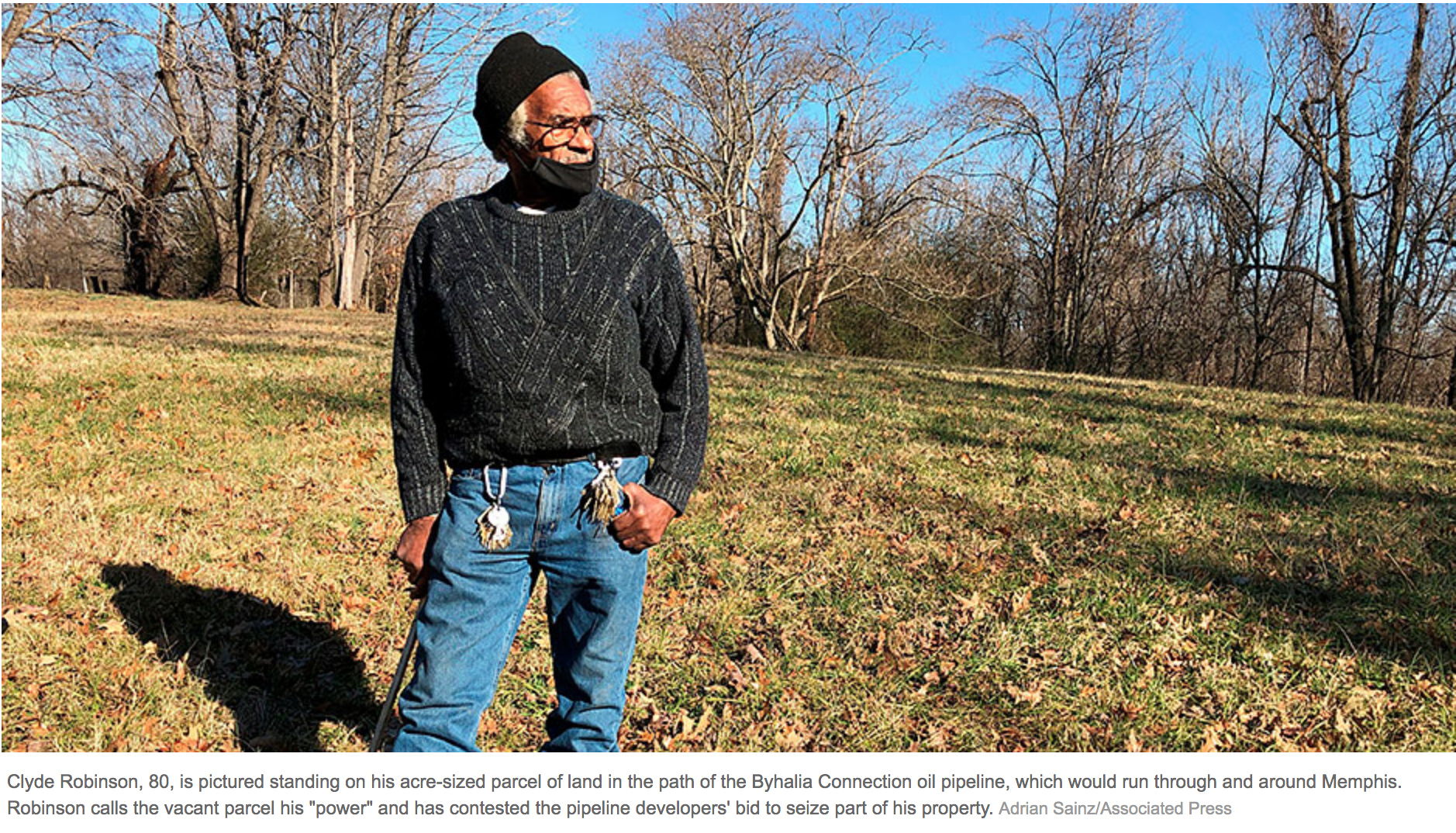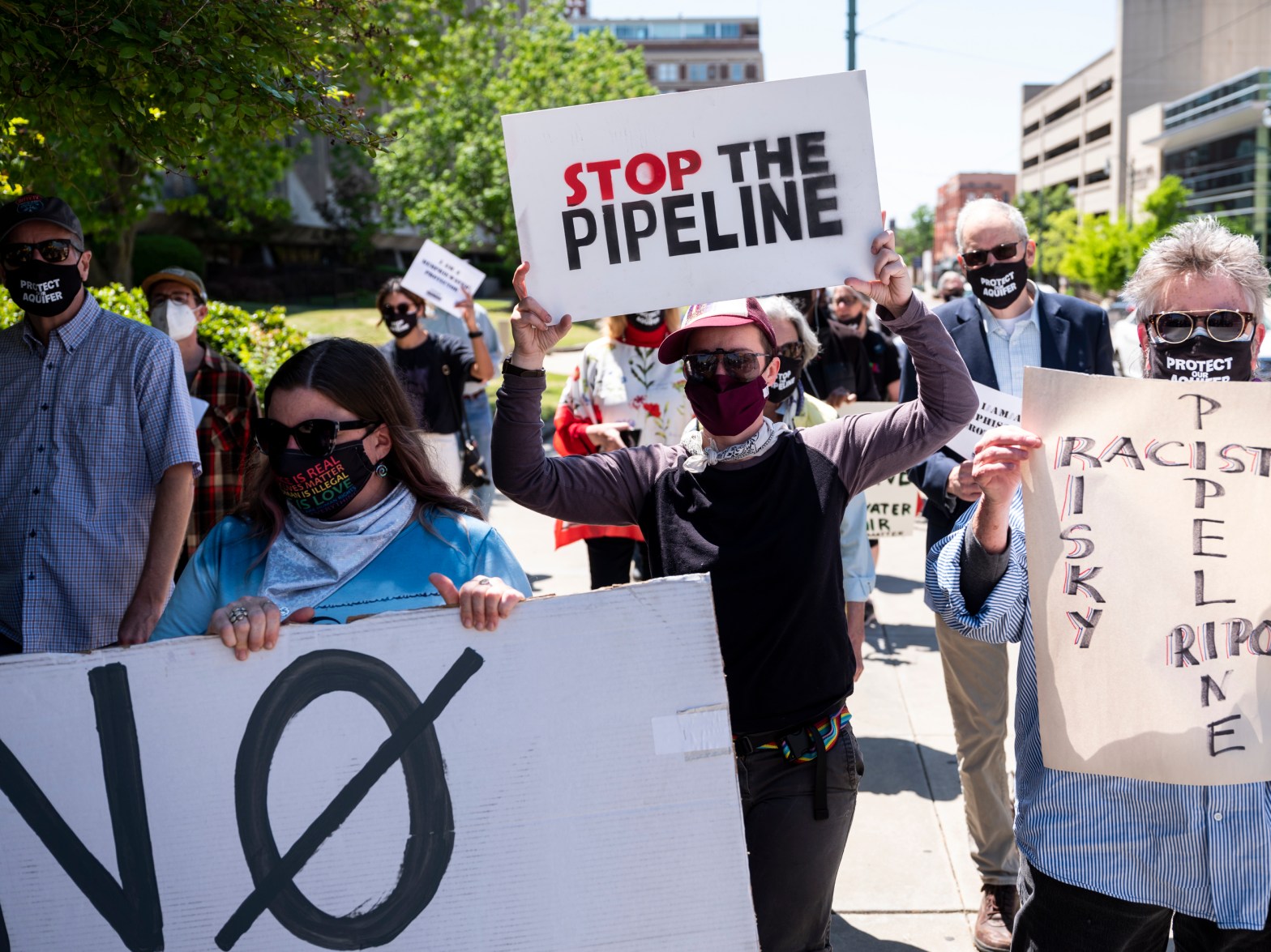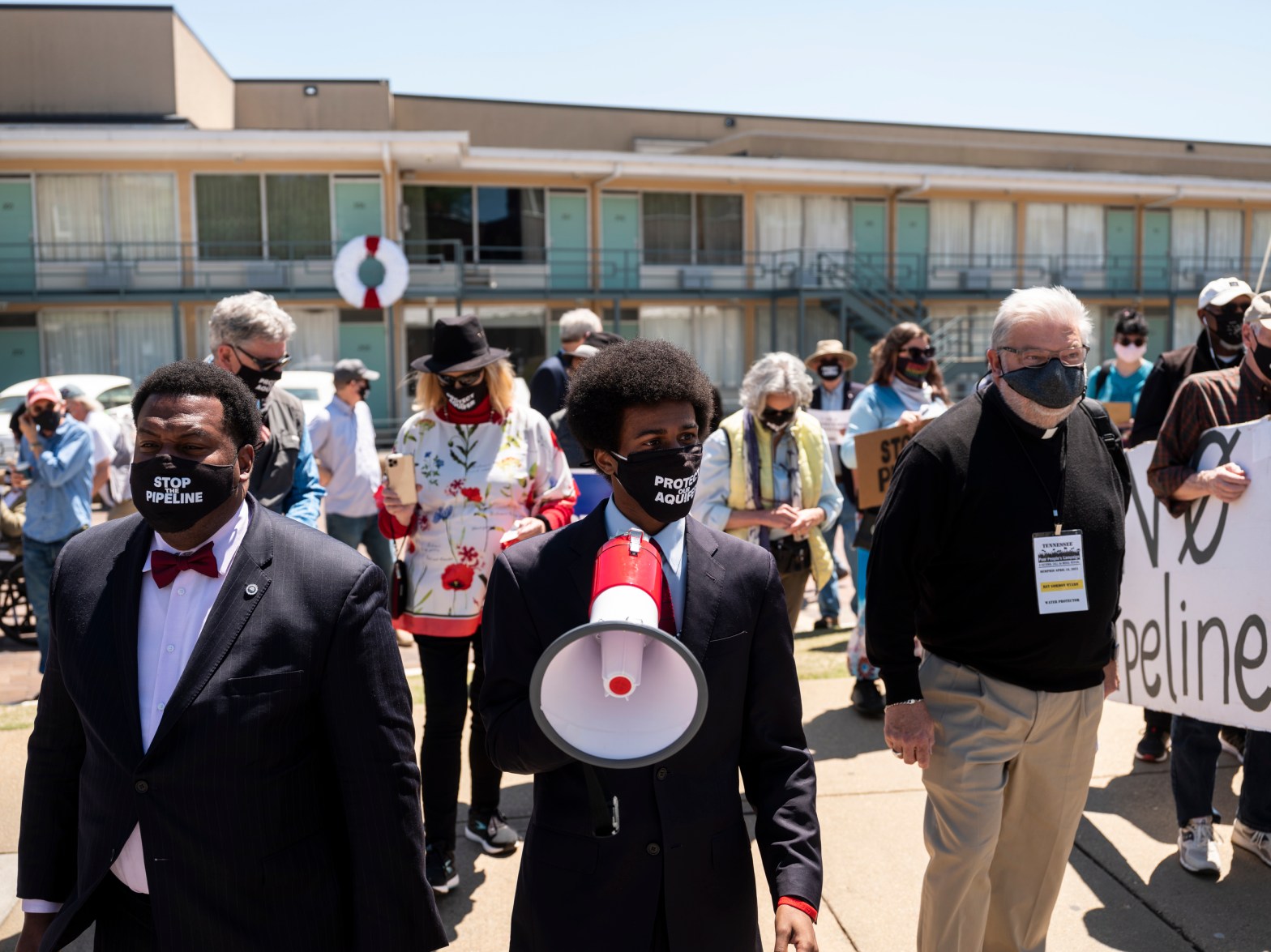
Justin J. Pearson, center, a co-founder of Memphis Community Against the Pipeline, led a march from the National Civil Rights Museum to Memphis City Hall Monday in support of an ordinance before the City Council that would regulate hazardous material underground transportation or storage, including by pipelines. (Photo: Brad Vest for MLK50)
UPDATE: On July 2, 2021, Byhalia Connection pipeline backers Plains All American and Valero announced that they cancelled the proposed pipeline project:
“Byhalia Connection LLC announced today that it is no longer pursuing the Byhalia Connection construction project primarily due to lower US oil production resulting from the COVID-19 pandemic. We value the relationships we’ve built through the development of this project, and appreciate those that supported the project and would have shared in its ongoing benefits including our customers, communities, energy consumers, landowners, area contractors, and suppliers.”
“Pipelines continue to play a critical role in safely transporting energy products from where energy is produced to where it is refined and turned into consumer goods that benefit our lives. As part of any shift to lower carbon energy, hydrocarbons will continue to be a critical part of meeting increasing global need for affordable, reliable energy. Access to all forms of energy improves quality of life, education and economic opportunity for individuals and communities throughout North America and across the globe.”
The proposed 45-mile Byhalia Pipeline, a joint venture of Valero and Plains All American, would cross through historically Black neighborhoods and landowner communities in the city of Memphis, TN (e.g. Boxtown) and into Mississippi — with Black landowners currently engaged in challenges to eminent domain condemnation of their land in the local courts. The environmental racism obvious in this “path of least resistance” and “sacrifice zone” routing means this project should be a target for the Biden administration’s claimed focus on #EnvironmentalJustice.
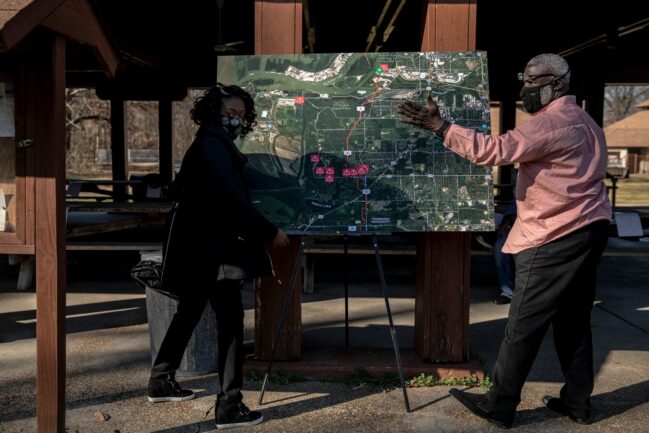
Kimberly Owens-Pearson and Batsell Booker, president of the Boxtown Neighborhood Association. (Photo: Andrea Morales for MLK50)
The proposed route also traverses the Memphis Sand aquifer that supplies Memphis and Shelby County with clean, reliable drinking water — the largest metropolitan area in the world that relies exclusively on groundwater for its municipal water supply — and the Davis Wellfield, which local utility Memphis, Light, Gas and Water uses to supply drinking water to several residential areas in southwest Memphis. The high-pressure pipeline would also cross Wellhead Protection Zone 2 and pass near numerous Source Water Protection Areas in Northern Mississippi. [source]
Byhalia would connect two existing crude oil pipelines — The Diamond Pipeline, which provides the Valero Memphis Refinery with crude oil to produce gasoline and jet fuels used by people in eight states in the region, including Tennessee and Mississippi, and the Capline Pipeline, which runs between central Illinois and the U.S. Gulf Coast. Byhalia Connection is currently in the pre-construction and easement acquisition phase of the project, targeting to start construction in 2021 and be in service approximately nine months later.
Local grassroots opposition groups including Memphis Community Against the Pipeline (MCAP) and Protect Our Aquifer have engaged in organizing at the national level and at the Shelby County Board, and Memphis City Council, including introducing an ordinance to protect the Memphis Sand Aquifer that the pipeline company has threatened to sue over. MCAP is also supporting landowners as an intervenor in eminent domain proceedings lodged against Black landowners.
Recent media coverage:
- (July 2, 2021): MLK50: ‘A victory for us’: Southwest Memphis residents elated as developers drop Byhalia Pipeline project
- (May 3, 2021): E&E News: Memphis pipeline faces environmental justice reckoning
- (March 12, 2021): WREG: Memphis group working to stop Byhalia Pipeline project
- (Jan. 25, 2021): InsideClimate News: Eminent Domain Lets Pipeline Developers Take Land, Pay Little, Say Black Property Owners
- (Sept. 10, 2020): MLK50: Pipeline through the heart: A Black neighborhood’s uphill battle against oil developers
Project Details
- Owner: Plains All American Pipeline, Valero
- Plains All American Pipeline is a publicly traded master limited partnership (“MLP”)
- Capacity: 220,000 barrels per day
- Length: 45 miles, Memphis, TN > Marshall County, MS (Independent: MAP; Company: MAP)
- Diameter: 20-inches
- Cost: [?]
- Status: Proposed
- Start Year: 2022
- Bank lenders: In 2017, Plains All American renewed a credit facility led by Bank of America, Citibank, JP Morgan Chase and Wells Fargo
Project Status
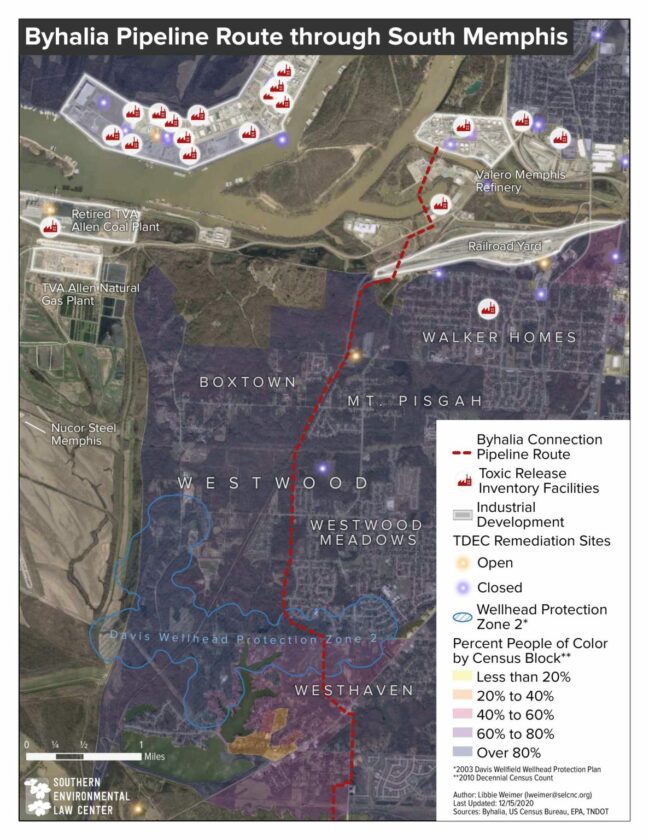
Map: Southern Environmental Law Center
Eminent Domain:
- March 2021: Judge allows community org Memphis Community Against the Pipeline to act as intervenor in eminent domain lawsuits brought against Black landowners by Byhalia [source]
- Black landowners targeted by Byhalia land agents
Indigenous Free, Prior & Informed Consent; Consultation & Environmental Justice:
- Opponents suspect environmental racism in pipeline project (Associated Press)
- The planned route cuts through a zip code that’s 97% Black (Memphis Commercial Appeal)
Outstanding Permits:
- May 2021: City of Memphis and Shelby Count Board still must hold votes on local permits and proposed ordinances on pipelines; status delayed both measures won’t be considered “until July as part of an agreement with Plains to ‘pause’ efforts to build the pipeline. [source]
- Memphis City Council Public Works, Solid Waste and General Services Committee due to vote on pipeline easement resolution
- May 2021: Southern Environmental Law Center files complaint with the EPA on behalf of Memphis Community Against the Pipeline against the Tennessee Department of Environment and Conservation, claiming TEDC violated Title VI of the Civil Rights Act of 1964 by issuing a permit to a pipeline that would disproportionately harm Black people. The complaint asks the EPA to require TDEC to revoke the permit and create a policy that considers potential discrimination in permit evaluations. [source]
- Tennessee Dept. of Water Resources permit process
- Feb. 10, 2021: The U.S. Army Corps of Engineers approves a Nationwide Permit 12 for the project.
- December 2020: SELC, MCAP, Protect our Aquifer, TN Sierra Club send letter to ACOE urging denial of NWP 12.
Impact Litigation / Court Fights:
- Federal Court:
- April 2021: Southern Environmental Law Center, Sierra Club, Protect Our Aquifer and Memphis Community Against Pollution file suit against U.S. Army Corps, argues Corps “did not fulfill its requirements under the Clean Water Act and the National Environmental Policy Act to assess potential impacts to the Memphis drinking water supply and the 130 streams and wetlands crossed by the proposed route through southwest Memphis and northern Mississippi.” [source]
- State Court:
- March 2021: Judge allows community org Memphis Community Against the Pipeline to act as intervenor in eminent domain lawsuits brought against Black landowners by Byhalia [source]


